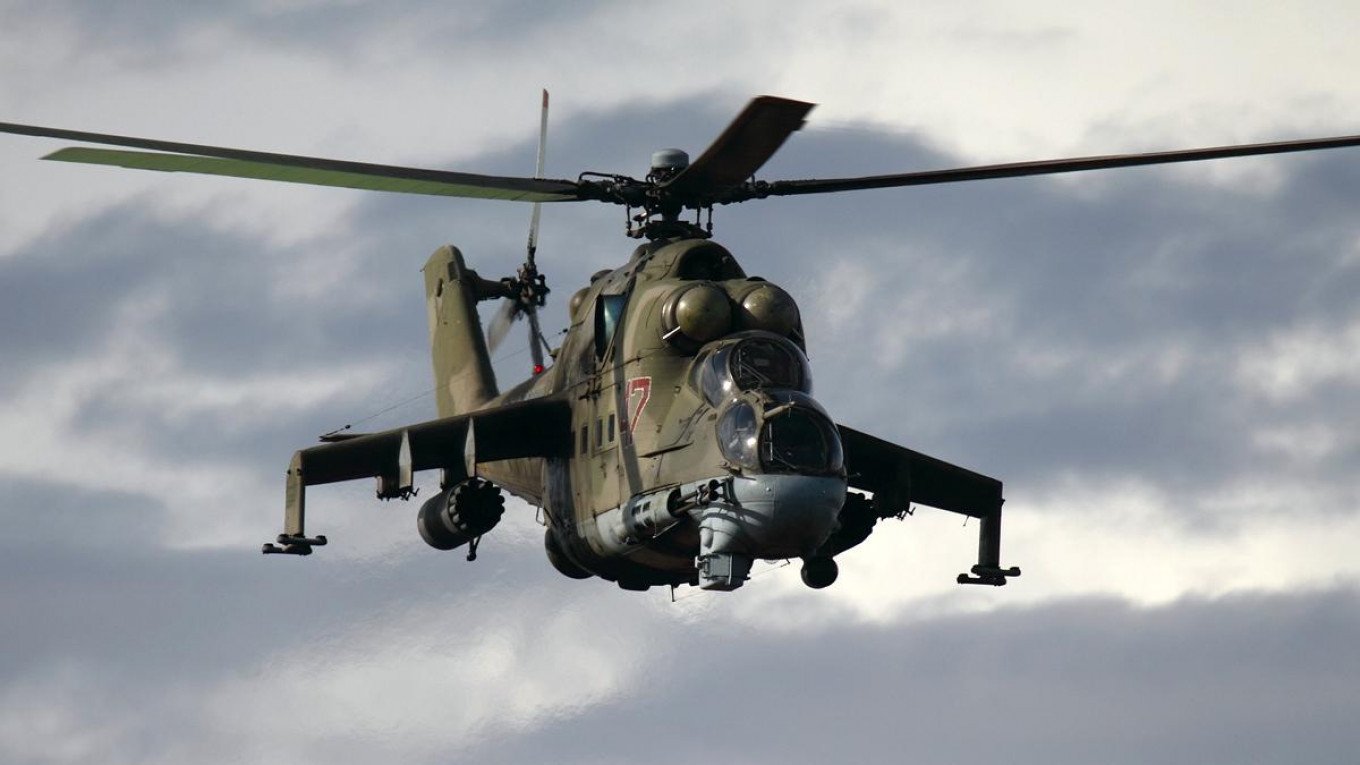
Azerbaijan accidently shot down a Russian military helicopter in Armenia as fighting raged over Nagorno-Karabakh on Monday, threatening to draw Moscow further into the conflict.
The Defense Ministry in Moscow said two crew members were killed when the Mi-24 helicopter was hit by a man-portable air defense system close to the border with Azerbaijan.
A third crew member was injured and evacuated, it said.
Azerbaijan quickly admitted to having accidently shot down the helicopter and apologized.
“The Azerbaijani side offers an apology to the Russian side in connection with this tragic incident,” the foreign ministry said in a statement, adding the move was an accident and “not aimed against” Moscow.
Azerbaijan said the decision was made to open fire on the helicopter due to the “tense situation in the region and increased combat readiness” after six weeks of fierce clashes with Armenia-backed separatists for control of Nagorno-Karabakh.
The helicopter was shot down near the Nakhchivan Autonomous Republic, a landlocked exclave of Azerbaijan between Armenia and Turkey, far from Nagorno-Karabakh.
Russia has a military pact with Armenia and a base in the country, but has so far insisted it would not get involved in the conflict with Azerbaijan unless Armenian territory itself came under threat.
Ferocious fighting continued over Nagorno-Karabakh on Monday, with conflicting reports of whether Azerbaijani forces had managed to capture the disputed region’s key town of Shusha, known as Shushi in Armenian.
‘Persistent battles’
Armenian officials insisted battles for the town were ongoing, with Prime Minister Nikol Pashinyan saying: “The fighting for Shushi continues.”
The Armenian government said there were “persistent battles” in recent days and that separatist forces “confidently defended and are defending the fortress city of Shushi.”
But Vahram Poghosyan, a spokesman for Karabakh’s separatist leader, posted on Facebook that Armenian forces had lost control of Shusha, a strategically vital town that is the region’s second-largest.
“We have to admit that a chain of failures still haunts us and the city of Shushi is completely out of our control,” Poghosyan said.
“The enemy is on the outskirts of Stepanakert,” he said, referring to the region’s main city, “and the existence of the capital is already in danger.”
Azerbaijani President Ilham Aliyev announced on Sunday his forces had taken Shusha, which lies around 15 kilometers (nine miles) from Stepanakert and on the main road to Armenia.
Aliyev said on Twitter on Monday that his forces had managed to capture 48 more settlements in Nagorno-Karabakh, an ethnic Armenian enclave that broke away from Azerbaijan’s control during a bitter war in the 1990s.
Fresh fighting over the region erupted in late September and Azerbaijani forces have been able to make substantial gains, sweeping across the region’s southern flank and into its heartland.
Mounting anger in Armenia
Anger appeared to be mounting in Armenia over the military losses, with 17 opposition parties on Monday calling on Pashinyan and the rest of his government to immediately resign.
The parties — including several of the country’s largest political groupings — said in a statement that Armenia’s leaders bore “the entire responsibility for the situation” in Karabakh.
“The authorities have lost their moral and political basis to represent the people,” they said.
Karabakh declared independence nearly 30 years ago but the declaration has not been recognized internationally, even by Armenia, and it remains a part of Azerbaijan under international law.
The recent fighting has been the worst in decades, with more than 1,000 people reported killed including dozens of civilians and the real death toll is believed to be much higher.
The clashes have forced thousands to flee their homes leaving Stepanakert a ghost town devastated after weeks of shelling.
The longstanding ex-Soviet rivals have left three recent ceasefire agreements brokered by the United States, Russia and France in tatters.
The three countries co-chair the “Minsk Group” that helped broker a truce in 1994 but has failed to mediate a lasting resolution to the long-simmering territorial dispute.
Diplomatic efforts appeared to ramp up over the weekend as fighting intensified near Shusha, with Russian President Vladimir Putin speaking Saturday to Turkish counterpart Recep Tayyip Erdogan and President Emmanuel Macron of France.
Turkey is a key ally of Azerbaijan and its involvement would be key to any agreement to halt the fighting.
